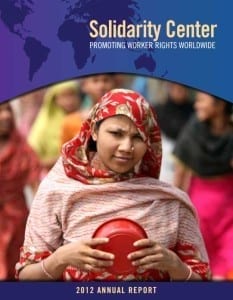Jan 2, 2013
As the new year begins, the ongoing global jobs crisis means workers everywhere are still struggling to find employment—some 200 million people, including 75 million age 25 or younger, are unemployed. Millions more, most of them women, are shut out of the labor force. The World Bank’s recently released “2013 World Development Report on Jobs” offers policymakers a new framework for looking at jobs and outlines why jobs that most benefit development can spur a virtuous cycle.
Notably, the report’s recommendations for successful job creation include well-designed labor policies. “Because [economic] growth alone may not be enough, labor policies need to facilitate job creation and enhance the development payoffs from jobs,” the report states. Yet it finds that many nations do not successfully protect worker rights because labor laws often cover only formal employment, and some labor laws deliberately exclude domestic workers, family workers or workers in small enterprises.
A key chapter, “Valuing Jobs,” points out that “the jobs with the greatest development payoffs are those that make cities function better, connect the economy to global markets, protect the environment, foster trust and civic engagement, or reduce poverty. Critically, these jobs are not only found in the formal sector; depending on the country context, informal jobs can also be transformational.”
Both the International Labor Organization (ILO) and the International Trade Union Confederation (ITUC) believe the World Bank report makes a positive step toward acknowledging the role of jobs and livelihoods in the development process. Both worker rights organizations also see flaws in the report, especially in its depiction of freedom of association. The ILO says the report raises “freedom of association as a right focused at workplace level, with very little reference to the important role that workers’ and employers’ organizations can play in national social dialogue around policy choices for job creation and development.”
The ITUC noted that the report promotes the concept of “good jobs,” rather than the well-established ILO objective of “decent work,” in which women and men obtain decent and productive work in conditions of freedom, equity, security and human dignity.
The need for world leaders and lawmakers to focus on creating quality jobs is higher than ever.
As the report states, “over the next 15 years an additional 600 million new jobs will be needed to absorb burgeoning working-age populations, mainly in Asia and sub-Saharan Africa.” Meanwhile, many workers with jobs “do not earn enough to secure a better future for themselves and their children, and at times they are working in unsafe conditions and without the protection of their basic rights.”
Jun 25, 2012
In a historic step for global labor solidarity, three global union federations came together this week to form IndustriALL Global Union, uniting 50 million workers across the supply chain. IndustriALL combines affiliates of the International Metalworkers’ Federation (IMF), the International Federation of Chemical, Energy, Mine and General Workers’ Unions (ICEM), and the International Textile, Garment and Leather Workers’ Federation (ITGLWF).
IndustriALL General Secretary Jyrki Raina, who was the general secretary of the IMF, told the 1,400 delegates to the founding congress in Copenhagen, Denmark, that they were joining “an extraordinary new family of heroes.” He outlined a 10-point plan—later passed as a resolution—aimed at ensuring IndustriALL support for affiliates, especially those in the front line of human rights and worker rights struggles.
Raina saluted the many Arab sisters and brothers at the congress who participated in the Arab Spring. In particular he pointed to Hashmeya Muhsin Hussein, the leader of the Iraqi Electricity Utility Workers Union, a longtime Solidarity Center partner.
Raina also recognized the repression and struggle of Los Mineros, the Mexican mine workers union and Solidarity Center partner whose president, Napoleón Gómez Urrutia, was elected to the IndustriALL executive committee. Gómez Urrutia congratulated the delegates on IndustriALL’s founding via video from Canada, where has been exiled since 2006 because of persecution by the Mexican government.
Recognizing that precarious work is on the rise across all sectors, affiliates resolved to support a global campaign to STOP Precarious Work, which draws upon existing campaigns led by ITGLWF, ICEM, and IMF with the aim of promoting equal treatment for precarious workers. Delegates also passed resolutions in support of the Fijian labor movement and Spanish miners.
Raina told the delegates that the creation of IndustriALL comes at a crucial time. “IndustriALL is a recognition of the increasing integration of global capital,” he said. “The increasingly related supply chains across different industries means union members need a stronger global voice.”


